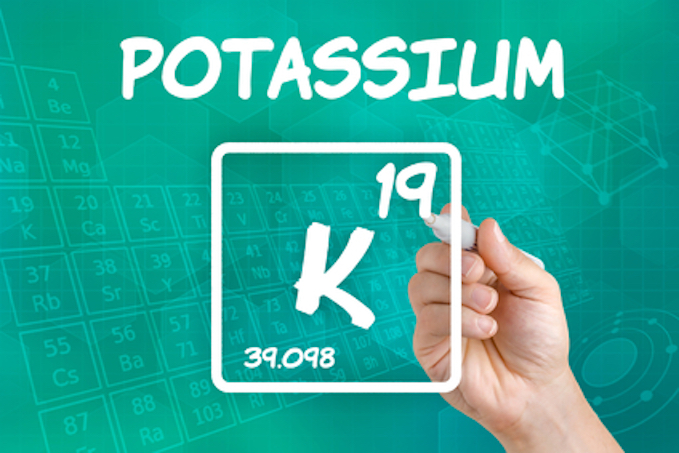There’s Probably Not Enough Potassium In Your Diet

How much potassium are you getting in your diet each day?
You probably have no freaking clue, right?
If you’re someone that works out and tries to eat healthy, you likely have a pretty good sense of the number of calories you’re eating (or should be eating).
In addition, you probably know that protein is important, as well as consuming the right amounts of fats and carbohydrates.
And as a matter of general health, you may even watch your salt (sodium) intake, since we’re always hearing that too much can be bad for us…
But what about potassium?
It’s not something that most of us think about, but the reality is that 75% of adults are deficient in potassium, based on the USDA standards.
That means that there is simply not enough potassium in most of our diets, which can lead to a variety of health problems if we’re not careful.
In this article, I’m going to be covering what exactly potassium is, why it’s important, how much you should be getting, and some easy ways to get more of it in your diet each day.
What Is Potassium?
Many people think that potassium is a vitamin, but it is actually a mineral (known as ‘K’ in the periodic table).
Chemically, it is fairly similar to sodium, and from a dietary standpoint the interplay between potassium and sodium is very important (more on that in a second).
Potassium is found naturally in a variety of foods, and tends to taste sweet in lower concentrations, while becoming bitter and salty in higher concentrations.
Why Potassium Is Important
Potassium plays a major role in our general health, helping to regulate fluid retention in our cells.
While sodium helps to bring water into cells, potassium does exactly the opposite, pumping water out of our cells.
In this sense, the ratio of sodium to potassium in your diet becomes very important for maintaining healthy fluid retention levels.
A diet that is too high in sodium, and low in potassium, can leave you feeling bloated and holding onto more water than you might like.
Worse, it can greatly increase the risk of hypertension and other cardiovascular problems, with a study by the CDC finding that people with the highest sodium/potassium ratios were twice as likely to die from a heart attack!
It’s Unlikely That You’re Getting Enough Potassium
Look, I’m not judging you here…
Still, the fact is that the vast majority of people don’t get anywhere near the RDA of 4.7 grams of potassium per day.
In fact, as I mentioned earlier in that article, only about 25% of people hit that number, making inadequate potassium one of the most common dietary deficiencies (especially in western diets).
This is because potassium is found primarily in vegetables, fruits, fish, and nuts – all foods that many people don’t eat enough of regularly.
What’s more, a diet heavy in processed foods tends to have very low levels of potassium, and correspondingly high levels of sodium, which is an all-too-common dietary profile for many people.
How Much Potassium Should You Be Getting?
As I mentioned above, the Institute of Medicine recommends that all healthy adults aim for 4.7 grams of potassium per day.
But what is perhaps more important is the ratio of sodium to potassium that you’re getting each day.
Ideally, you want to be getting a 2:1 ratio of potassium to sodium.
In practical terms, this means trying to get 4.7 grams of potassium, and roughly 2.3 grams of sodium (which also follows the USDA’s recommendation).
That said, for certain people it makes sense to limit their potassium to lower levels, if they have kidney issues that reduce their ability to properly excrete potassium.
For this reason, before making any drastic changes, I recommend first getting a blood test to get a sense of your current levels of potassium, and then go from there.
Can You Get Too Much Potassium?
It’s not very likely, but it is possible…
Although there is no official upper limit to potassium intake, there have been cases of people experiencing cardiac problems when consuming massive quantities, in the 18 gram range.
Thankfully, in practical terms, this is extremely difficult to do, so you shouldn’t worry about it too much, unless you’re taking a ton of potassium supplements (I’ll discuss this more in a second).
And, as I mentioned before, if you have certain kidney problems, you may be unable to rid your body of potassium properly, putting you at risk of hyperkalemia.
How To Get More Potassium In your Diet
There are several ways to do this…
The first is to take a potassium supplement – like this one from NOW Foods – which might seem like an ideal solution to the problem.
However, due to federal regulations, potassium supplements are limited to 99 grams, which only scratches the surface when you’re trying to regularly hit your 4.7 gram intake.
Instead, a better approach is to start including a variety of potassium-rich foods in your diet.
What this typically means is replacing some of the processed foods that you’re eating with more vegetables, fruits, fish, and nuts – so by focusing on getting more potassium you’ll also get the numerous other health benefits of eating more unprocessed foods.
Finally, if you’re looking for a simple way to simultaneously decrease your sodium intake and increase your potassium intake, then you should consider getting a potassium-based salt substitute.
These can be an acquired taste for some people, but it can make a pretty big difference in bringing your sodium/potassium levels into better balance.
And for some more specific suggestions of high potassium foods that you should be eating, look out for my article next week where I’ll cover the best potassium-rich foods to focus on.